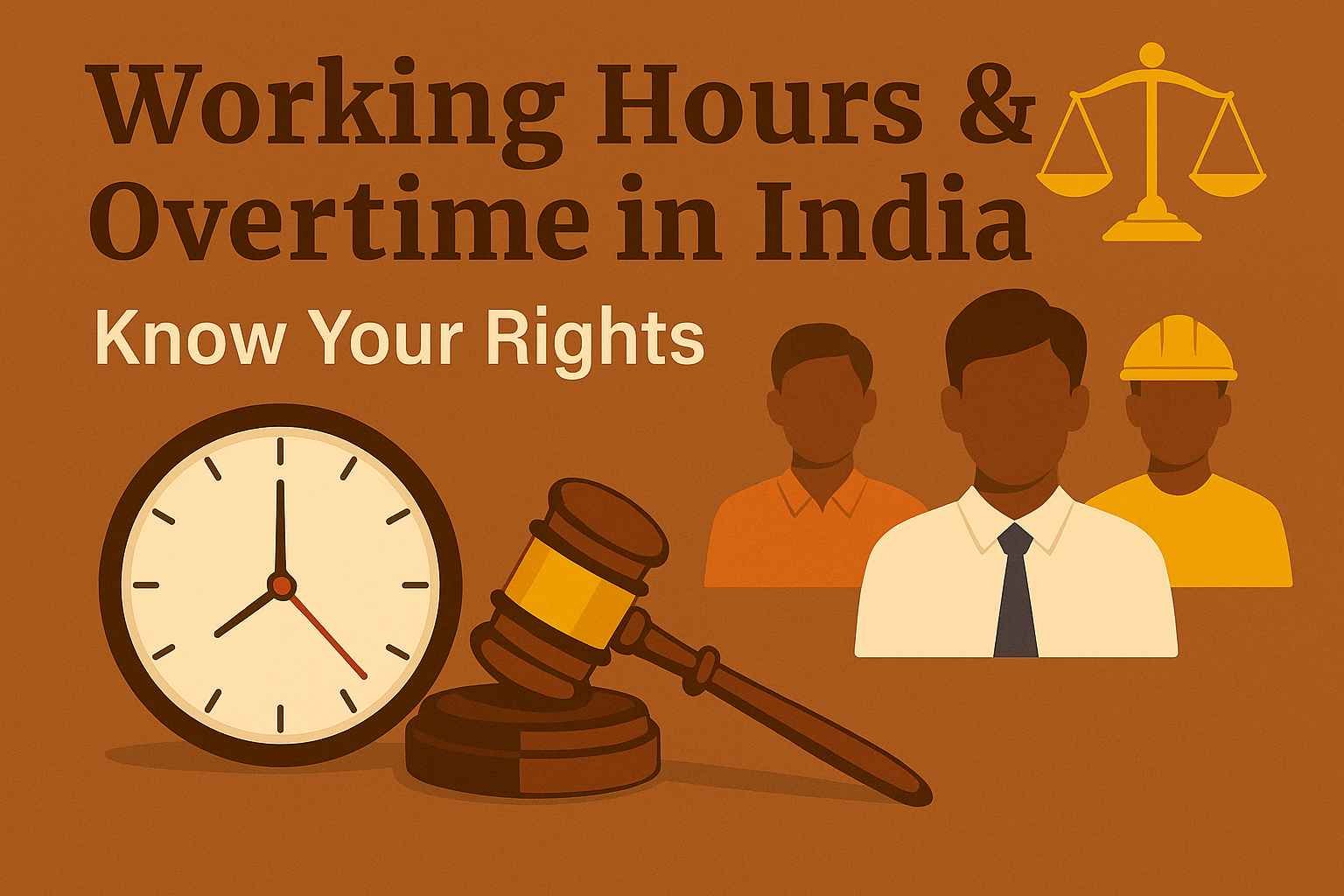On this page you will read detailed information about Working Hours & Overtime in India.
Work is an important part of life, but so is rest. To protect workers from exploitation and ensure they have time for personal and family life, India has enacted clear laws regulating working hours, rest periods, and overtime pay. These laws balance the needs of businesses with the rights of employees.
If you are an employee, knowing your rights can help you avoid unfair treatment. If you are an employer, understanding these rules is essential to remain compliant and maintain a healthy workplace. This blog explains the legal framework on working hours and overtime in India in simple terms.
Legal Framework Governing Working Hours
Working hours in India are primarily regulated under:
- Factories Act, 1948
- Governs working hours in factories and manufacturing units.
- Applies to both adult workers (above 18) and adolescent workers (15–18 years).
- Shops and Establishments Acts (State Laws)
- Each state has its own Act regulating working hours for offices, shops, and commercial establishments.
- Labour Codes (yet to be fully implemented)
- The Occupational Safety, Health and Working Conditions Code, 2020 consolidates several older laws, including provisions on working hours and overtime.
- Other Industry-Specific Laws
- For example, the Mines Act, 1952 and Motor Transport Workers Act, 1961 have special rules due to the nature of those jobs.
Standard Working Hours
Under the Factories Act, 1948
- Maximum Daily Hours: 9 hours a day.
- Maximum Weekly Hours: 48 hours per week.
- Rest Intervals: Workers must get a break of at least 30 minutes after 5 hours of continuous work.
- Weekly Holiday: At least one day off each week, typically Sunday.
Under Shops and Establishments Acts
- Most states prescribe:
- 8–9 hours a day
- 48 hours a week
- Mandatory weekly holiday (often Sunday or a fixed day chosen by the employer).
Under Labour Codes (proposed)
- The 2020 Labour Code proposes to cap daily working hours at 8 hours, with a total of 48 hours per week. States may notify specific rules when implemented.
Overtime Rules in India
Overtime is work done beyond the prescribed daily or weekly limit.
Factories Act, 1948
- Overtime Limit: More than 9 hours a day or 48 hours a week.
- Overtime Pay Rate: Twice (2x) the ordinary rate of wages.
- Maximum Overtime: Not more than 50 hours in a quarter (with some state amendments allowing up to 75 hours).
Shops and Establishments Acts
- Rules vary from state to state. Generally:
- Overtime beyond 8–9 hours a day or 48 hours a week must be paid at double the normal wage rate.
- Some states also fix monthly or quarterly caps on overtime.
Special Categories
- Mines Act, 1952: Maximum daily limit of 9 hours; overtime at double wages.
- Motor Transport Workers Act, 1961: Overtime for work beyond 8 hours a day.
Rights of Employees Regarding Overtime
Employees have specific rights when it comes to overtime:
- Right to Refuse – Employers cannot force overtime beyond legal limits without consent.
- Right to Double Pay – Overtime must always be paid at twice the ordinary wage rate.
- Right to Records – Factories and shops must maintain registers showing hours of work and overtime performed.
- Right to Rest – Even when overtime is done, rest breaks and weekly holidays must be respected.
Employer Obligations
Employers must:
- Keep track of employee working hours.
- Pay overtime wages promptly at double the normal rate.
- Ensure no worker exceeds statutory maximums.
- Maintain registers for inspection by labour officers.
Failure to comply can lead to penalties, fines, or even prosecution under labour laws.
Women and Young Workers
- Women: Earlier, women could not work between 7 PM and 6 AM in factories, but with recent amendments and court rulings, many states now allow women to work night shifts, provided safety measures are in place.
- Adolescents (15–18 years): Cannot work more than 4.5–6 hours a day and are not allowed to work overtime.
- Children (under 14 years): Prohibited from working in most occupations under the Child Labour (Prohibition and Regulation) Act.
Case Law on Working Hours and Overtime
- Municipal Council, Ratlam v. Vardichand (1980): The Supreme Court emphasized the duty of employers and governments to safeguard workers’ rights and health.
- Labour Commissioner v. Bharat Petroleum (1991): Courts reiterated that overtime wages at double rates are mandatory, not optional.
Impact of the Labour Codes
The new Occupational Safety, Health and Working Conditions Code, 2020, once enforced, will:
- Uniformly regulate working hours across sectors.
- Allow flexible working hours (such as four-day work weeks) as long as total hours stay within 48 hours a week.
- Reinforce double pay for overtime.
While not yet in effect, these codes are expected to simplify compliance and bring consistency across states.
Practical Challenges in Enforcement
Despite strong laws, implementation remains uneven:
- Unorganized Sector: Many workers, especially in small shops and informal industries, are unaware of their rights.
- Record-Keeping Gaps: Employers sometimes fail to maintain proper registers.
- Reluctance to Pay Overtime: Workers may be asked to work “off the books” without overtime pay.
- Weak Inspections: Labour inspectorates are often understaffed, limiting enforcement.
Tips for Employees
- Keep personal records of your work hours.
- Ask for payslips that reflect overtime wages.
- Report violations to the local labour office.
- Seek legal help if overtime dues remain unpaid.
In the previous post, we had shared information about 8 Important Rights of Private Employees Under Indian Labour Law, so read that post also.
Tips for Employers
- Stay updated on state-specific laws.
- Maintain accurate attendance and overtime registers.
- Ensure fair pay to avoid disputes or penalties.
- Create clear HR policies on working hours and overtime.
Conclusion
India’s laws on working hours and overtime are designed to protect the dignity and well-being of workers while allowing industries to function efficiently. The Factories Act, Shops and Establishments Acts, and upcoming Labour Codes together ensure that employees are not overworked and are fairly compensated when they go beyond regular hours.
For employees, awareness of these rights is empowering. For employers, compliance is not just a legal duty—it is also good business practice that builds trust and morale.
Ultimately, respecting limits on working hours and paying fair overtime is about more than law—it is about creating a balanced workplace where productivity and humanity coexist.
Disclaimer
The information and services on this website are not intended to and shall not be used as legal advice. You should consult a Legal Professional for any legal or solicited advice. While we have good faith and our own independent research to every information listed on the website and do our best to ensure that the data provided is accurate. However, we do not guarantee the information provided is accurate and make no representation or warranty of any kind, express or implied, regarding the accuracy, adequacy, validity, reliability, availability, or completeness of any information on the Site. UNDER NO CIRCUMSTANCES SHALL WE HAVE ANY LIABILITY TO YOU FOR ANY LOSS OR DAMAGE OF ANY KIND INCURRED AS A RESULT OR RELIANCE ON ANY INFORMATION PROVIDED ON THE SITE. YOUR USE OF THE SITE AND YOUR RELIANCE ON ANY INFORMATION ON THE SITE IS SOLELY AT YOUR OWN RISK. Comments on this website are the sole responsibility of their writers so the accuracy, completeness, veracity, honesty, factuality and politeness of comments are not guaranteed.
So friends, today we talked about Working Hours & Overtime in India, hope you liked our post.
If you liked the information about Working Hours & Overtime in India, then definitely share this article with your friends.
Knowing about laws can make you feel super smart ! If you find value in the content you may consider joining our not for profit Legal Community ! You can ask unlimited questions on WhatsApp and get answers. You can DM or send your name & number to 8208309918 on WhatsApp









